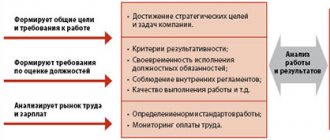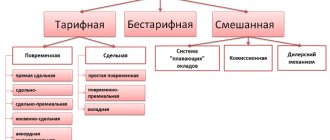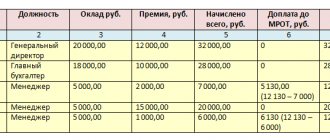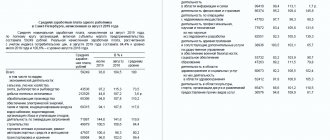Incentive production: general characteristics
UDC 342.9
Magazine pages: 33-37
V.V. VOLKOVA,
Candidate of Legal Sciences, Associate Professor of the Department of State and Legal Disciplines of the North Caucasus Branch of the Russian Academy of Justice
The general characteristics of incentive proceedings are considered as a set of stages of incentives, the purpose of which is public recognition of the merits of a civil servant. It is concluded that the improvement of local legal regulation is to fill the gaps in the procedural rules for the implementation of the rights and obligations of subjects of incentive legal relations.
Key words: incentives, stages of production, principles, civil servant, administrative law, labor law.
Production of encouragement: general description
Volkova V.
This article is devoted to common description of production of encouragement. It is totality of stages of encouragement. The purpose of this production is public confession of services of employee, respect for his efficient and just service. The conclusion of the article is that the perfection of local law regulation is gaps in procedure rules of filling subject rights and obligations in encouragement relations.
Keywords: encouragement, stages of production, principles, employee, administrative law, labor law.
Incentive proceedings do not at all fit into the idea of process as a legal category, formed under the influence of the scientific characteristics of long-existing and officially recognized processes - civil and criminal.
A.A. Grishkovets explains it this way: the administrative process in the mid-1960s was viewed as a kind of copy of the criminal and civil processes[1]. The procedure for considering disputes in the field of public administration derives its “pedigree” from the civil process, and proceedings in cases of administrative offenses originate from the criminal process.
Public administration - the field of activity of the system of executive authorities of the Russian Federation - is a diverse organizational and power activity, during the implementation of which the functions of applying persuasive measures, including legal ones, provided for by legislation at various levels in the Russian Federation are constantly used. In the course of their activities, public authorities are simply obliged, in appropriate cases, to use various means of encouraging citizens, thereby noting their positive actions. The activities of this plan are undoubtedly legal, because, firstly, the competent state bodies and officials do not officially apply any incentive measures, but only those that are established by special regulations (primarily decrees of the President of the Russian Federation, as well as decrees of the Government of the Russian Federation )[2], and secondly, the very procedure for applying these measures is regulated by legal norms related to administrative procedural law.
Approximately these considerations were guided when it was first proposed in the late 1960s to include administrative proceedings and promotion proceedings in the system of proceedings. As expected, there was an extremely negative reaction, primarily from specialists in the field of civil and criminal proceedings[3]. Supporters of the “jurisdictional” concept also disagreed with the idea.
Undoubted evidence of the legal nature of this proceeding is the numerous normative legal acts of a substantive and procedural nature that regulate the main aspects of this procedure.
Incentive proceedings are a set of stages of encouragement, the purpose of which is to publicly recognize the merits of a civil servant, to give him honor and respect for effective and conscientious service in positions in government bodies. Procedures related to incentives are not typical for organizations of various forms of ownership and departmental affiliation. They can be overly complex or, on the contrary, simplified. Nevertheless, encouragement requires gradual adherence to a certain order, deviation from which may result in a violation of material rights and obligations.
The peculiarity of incentive procedures is that they regulate the procedure for rewarding employees[4]. Each procedure includes certain stages, which are established either normatively or individually by agreement of the parties.
According to V.N. Protasov, the normative model of the procedure should determine: the purpose and type of basic relationships, the range of participants, the acts of behavior that they can and should perform, the sequence of their implementation, the timing and place of implementation of both individual actions and the procedure as a whole, the means that ensure it functioning[5].
The Labor Code of the Russian Federation and legislation on incentives for civil servants do not contain all the elements of such a model. Thus, we can conclude that the procedural side of the application of incentive norms has not yet been sufficiently studied.
In our opinion, we can highlight the features of incentive production.
1. Incentive proceedings are characterized by a certain procedural regime, which makes it possible to more responsibly, fairly, and competently achieve results, i.e., rewards for a civil servant.
2. The structure of this regime includes the regulatory legal framework for incentives; material and procedural incentive standards; goals, objectives, functions, principles of incentive production; compliance with guarantees to achieve a positive effect, etc.
3. The procedural incentive regime and incentive production can be considered through the philosophical categories “content”, “form”, where the first means an incentive regime, and the second means incentive production.
It seems that we can also highlight the basic principles of incentive activities: validity, efficiency, transparency, diversity, which flow from the general principles of the functioning of the public executive power. Their observance ensures the effectiveness of this type of government.
Validity means, firstly, the presence of merit, and secondly, its correspondence to the reward. The obvious disproportion of the incentive measure to its actual basis can cause not joy in the recipient and those around him, but grief and even a feeling of injustice. The principle of correspondence is also violated when large bonuses (ranks, awards) are given for small merits.
Publicity of promotional activities is important both for the one who distinguished himself and for those around him. It increases the authority of the person being rewarded and improves the attitude of others towards him. And at the same time, it has a positive effect on many of those who learned who was rewarded and for what.
The principle of diversity is due to the huge variety of actions that deserve to be rewarded, to which the administration must respond differently, using a large arsenal of incentive measures. In addition, these actions can be repeated and even multiple. Repeated encouragement of one subject of law should not be monotonous. The stimulating role of repeated thanks, bonuses, etc., due to the characteristics of the human psyche, is gradually decreasing.
Encouragement has a better effect on the recipient and others if it is done promptly and in a timely manner.
The Labor Code of the Russian Federation establishes the following procedures. The legislator, having assigned the exclusive right of incentives to the employer, thereby granted him the right to independently determine the procedure for incentives, while in Art. 132 of the previously existing Labor Code established the use of incentives by the employer jointly or in agreement with the relevant elected body. This procedure, as an alternative to the individual application of incentive measures, is currently used mainly in large organizations.
Article 372 of the Labor Code of the Russian Federation provides for procedures for consulting an employer with an elected trade union body in order to achieve a mutually acceptable agreement on incentives (regarding the candidacy and incentive measures). Such additional consultations are carried out at the initiative of the employer and in the event of disagreement of the elected trade union body with the draft local regulatory act regulating the types and grounds of incentives[6].
Agreeing with V.N. Protasov that the norms establishing substantive legal procedures should be as close as possible to the legislative system, to those regular norms, the implementation of which they ensure, it should be noted that the procedural norms providing for the procedure for implementing incentives should be enshrined in the text of that normative legal the act in which the incentive measure was consolidated. The argument confirming this position is that procedural norms mediate “the normal, positive implementation of regulatory norms of legal relations,” “which generally cannot be implemented without the help of proper procedure.” In addition, “the emergence of basic norms, the implementation of which the procedure serves, and procedural norms must be synchronous”[7].
The legislator, apparently taking into account the variety of forms and types of incentives, considered it appropriate to place the burden of procedural regulation on local rulemaking[8]. In practice, procedures related to the implementation of special incentive measures are enshrined in the text of the regulatory legal act by which they are established.
Thus, we can conclude that there is no normative consolidation of the fundamental principles of procedural regulation, general and special requirements for incentive proceedings, for its system, and regulation of the order of actions of incentive participants.
In conditions of imperfection of local procedural regulation and strengthening of the “owner’s” power of the employer, it seems necessary to limit the excessive formalization of the procedure, since timely encouragement is important.
Employers use the rights granted to them at their own discretion, and not without success, allowing for cases of a subjective approach in determining the circle of those encouraged and the amount of material incentives, as well as in other matters. At the same time, the absence of a procedure may make it impossible to challenge the use (non-use) of incentives, the results that complete law enforcement procedures[9].
To avoid such cases, at the level of procedural norms, it is necessary to regulate the procedure for preliminary assessment of the labor merits of employees nominated for promotion directly by the head or authorized person of a structural unit, curator, or body representing the interests of employees. “The intra-collective nature of distribution ties allows, using the mechanism for submitting bonuses, without resorting to sanctions on the part of the employer. In this case, negligent workers may not be nominated for bonuses at all, for which an order from the administration is not required, but a decision of the team is sufficient...”[10]
A change in incentives is possible at the initial stage of development of the incentive procedure, before the issuance of an incentive act, when it is changed or even completed without giving rise to rights and obligations. The employer, in the event of circumstances affecting his initial expression of will, has the right to reconsider his position regarding the promotion of specific individuals, as well as the incentive measure or amount. In this situation, the promotion should be considered failed.
Cancellation of an incentive is possible if circumstances are identified under which the incentive would not have taken place (unreliability of information, error, dishonesty of the employee), and involves the cancellation of the order, exclusion of the incentive entry from the work book, deprivation of the employee of the benefits provided by the incentive and the onset of other consequences associated with invalidity of the promotion.
An incentive can be declared invalid in this manner only if the employee has a subjective right to an incentive, as evidenced by both the issuance of an order by the employer and the delivery of an incentive or a public promise of an award (unless the employee disputes the grounds for it). Otherwise, procedural rules come into play.
Money (bonuses) paid to an employee as a result of unjustified incentives are not subject to withholding, except for the cases provided for in Art. 137 of the Labor Code of the Russian Federation, when the amount of the bonus was unreasonably paid to the employee due to a calculation error, as well as in the event that the body for the consideration of individual labor disputes recognizes the employee’s guilt in failure to comply with labor standards.
In contrast to cancellation, deprivation of incentives is associated with the employee’s guilty behavior, expressed in the commission of illegal actions (inaction), which served as the basis for such cancellation and became known after the issuance of the order on incentives (reporting false information, forgery of documents). This procedure pursues the goal not so much of punishing the employee for an offense, but of eliminating all the adverse consequences of his guilty behavior. According to the conditions of application, it is similar to the application of disciplinary measures (in the presence of misconduct, guilt and causation).
There are cases of deprivation of honorary titles for violation of labor and production discipline: improper performance of labor duties, absenteeism, appearing at the workplace while drunk, systematic tardiness, early leaving work and other violations of internal labor regulations, regime (theft, deliberate improper execution of documents ), - as well as for violation of public order, for misconduct in everyday life, as a result of criminal or administrative liability.
Deprivation of a rank as a disciplinary measure involves the issuance of an appropriate order by the manager. If the title was awarded on the basis of a decision of a collegial body, then it may also make a decision on deprivation of the right. In this case, the employee is deprived of all the benefits associated with the assignment of the title[11]. Sometimes procedural norms regulate the procedure for submitting materials against an employee who has discredited an honorary title.
A number of local legal acts provide for the possibility of applying such a measure of liability as deprivation of an honorary title awarded to an employee for labor merits in the organization, which clearly worsens his position in comparison with labor legislation, which establishes an exhaustive list of disciplinary measures for violation of labor discipline. Exceptions are cases where deprivation of rank is directly provided for by current legislation. Thus, Articles 43 and 45 of the Criminal Code of the Russian Federation indicate the possibility of applying, along with the main one, additional punishment in the form of deprivation of a special, military or honorary title, class rank and state awards to persons found guilty of committing a crime by a court verdict[12].
In this regard, the question of restoration of incentive rights arises. In the absence of an appropriate procedure, the implementation of procedural norms and judicial protection are required. When the basis for deprivation of a title was an order to impose a disciplinary sanction, its cancellation by the employer or invalidation by the court is the basis for the restoration of violated rights.
How justified are the establishment of requirements for annual confirmation of the title and its deprivation on the basis that the employee refused to undergo this formal event? Since the assignment of additional responsibilities not provided for by the employment contract to an employee is possible only with the consent of the employee, and the acceptance of incentives does not yet constitute consent to accept additional obligations, then refusal to fulfill them is not a reason for the application of sanctions to the employee by the employer, grounds for which are strictly regulated by law[13].
Sometimes the procedure is necessary, for example, when establishing an additional payment or individual bonus for an employee awarded an honorary title. In this case, an order is issued, since this entails a change in the essential conditions of remuneration, requiring appropriate registration and protection in the event of disagreements.
Procedures regarding the formation of material incentive funds are also directly related to incentives. Their presence indicates the reality of the employer’s financial capabilities and his intention to encourage conscientious work.
Thus, the main task standing in the way of improving local legal regulation is to fill gaps in the procedures for implementing rights and obligations and protecting the legitimate interests of subjects of incentive legal relations.
Based on the inexpediency of cluttering the law with procedural norms, the legislator shifting the burden of legal regulation of incentives to local rule-making is quite justified, however, the main types of procedures and the requirements for them, means of support should be reflected in the Labor Code of the Russian Federation, which would ensure compliance with the principles of optimality and guarantee of incentives.
One should agree with the proposal on the possible fixation of the basic principles of legal regulation of labor procedural relations: democracy of legal regulation; variety of systems and individual types of procedures, procedural forms, methods and means; maintaining the possibility of challenging the results that complete law enforcement procedures, as well as subsequent acts and actions based on these results[14].
Associated with the normative fixation of the principles is the possibility of adverse consequences for the employer if he violates the requirements of the incentive procedure or ignores it.
The establishment of procedural rules of different content and purpose in legislation or at the level of local regulations should be aimed at ensuring the implementation of the rights and obligations of subjects of incentive legal relations from different sides and under different conditions.
Bibliography
1 See: Grishkovets A.A. Legal regulation of the state civil service in the Russian Federation: Textbook. well. - M., 2003. P. 431.
2 See, for example, decrees of the President of the Russian Federation dated July 25, 2006 No. 765 “On one-time incentives for persons serving in the federal public service”; dated February 18, 2005 No. 177 “On monthly monetary incentives for certain categories of military personnel and employees with special ranks”; Decree of the Government of the Russian Federation dated September 21, 2000 No. 708 “On approval of the Charter on the discipline of workers of the fishing fleet of the Russian Federation”; Order of the Ministry of Internal Affairs of Russia dated February 20, 2007 No. 174 “On the payment of monthly monetary incentives to certain categories of military personnel of the internal troops of the Ministry of Internal Affairs of Russia.”
3 See: Sorokin P.A. Human. Civilization. Society // General ed., comp. and preface A.Yu. Sogomonova: Per. from English - M., 1992. P. 77.
4 See: Labor procedural law: Proc. allowance / Ed. V.N. Skobelkina. - Voronezh, 2002. P. 139.
5 See: Protasov V.N. Legal procedure. - M., 1991. P. 51.
6 See: Commentary on the Labor Code of the Russian Federation / Ed. L.N. Anisimova. - M., 2006. P. 261.
7 Protasov V.N. Decree. slave. P. 51.
8 See: Ukhova L.D. Incentive procedures in labor law // Labor Law. 2006. No. 6. P. 18.
9 See: Labor procedural law. P. 51.
10 Molodtsov M.V., Shakhov V.D., Yakushev V.S. Enterprise rights. - Sverdlovsk, 1989. P. 121.
11 See: Ukhova L.D. Decree. slave. P. 19.
12 See: Commentary on the Criminal Code of the Russian Federation / Rep. ed. V.M. Lebedev. - M., 2005. P. 89.
13 See: Ukhova L.D. Decree. slave. P. 19.
14 See: Labor procedural law. P. 56.
How to write a term paper on speech therapy
07.09.2010 169353
These guidelines are compiled to help students gain an understanding of the content and structure of coursework in speech therapy.
Logopedia of pedagogical science that studies anomalies of speech development with normal hearing, explores the manifestations, nature and mechanisms of speech disorders, develops the scientific basis for overcoming and preventing them means of special training and education.
The subject of speech therapy as a science is speech disorders and the process of training and education of persons with speech disorders.
The object of study is a person suffering from a speech disorder.
The main task of speech therapy as a science is the study, prevention and elimination of various types of speech disorders.
Coursework in speech therapy is a student's scientific and experimental research. This type of educational activity, provided for by the educational and professional program and curriculum, contributes to the acquisition of skills in working with literature, analyzing and summarizing literary sources in order to determine the range of insufficiently studied problems, determining the content and methods of experimental research, processing skills and qualitative analysis of the results obtained. The need to complete coursework in speech therapy is due to the updating of knowledge concerning the content, organization, principles, methods and techniques of speech therapy work.
As a rule, during their studies, students must write two term papers - theoretical and practical.
The first course work should be devoted to the analysis and synthesis of general and specialized literature on the chosen topic. Based on this analysis, it is necessary to justify and develop a method of ascertaining (diagnostic) experiment.
In the second course work, it is necessary to provide an analysis of the results obtained during the ascertaining experiment, as well as determine the directions and content of speech therapy work, and select adequate methods and techniques of correction.
So, let’s present the general requirements for the content and design of coursework in speech therapy.
The initial and most important stage of working on a course project is the choice of a topic, which is either proposed by the supervisor or chosen by the student independently from a list of topics that are consistent with the areas of scientific research of the department.
Each topic can be modified, considered in different aspects, but taking into account a theoretical and practical approach. Having chosen a topic, the student needs to think through in detail its specific content, areas of work, practical material, etc., which should be reflected both in the formulation of the topic and in the further construction of the study. It should be recalled that the chosen topic may not only have a purely theoretical orientation, for example: “Dysarthria. Characteristics of the defect”, “Classification of dysgraphia”, but also take into account the practical significance of the problem under consideration, for example: “Speech therapy work on speech correction for dysarthria”. It should also be taken into account that when formulating a topic, excessive detail should be avoided, for example: “Formation of prosodic components of speech in preschoolers of the sixth year of life attending a preschool institution for children with severe speech impairments.”
The course work includes such mandatory parts as: introduction, three chapters, conclusion, bibliography and appendix.
The text of the term paper begins with the title page . An example of its design can be seen here.
Then the content of the work is given, in which the names of chapters, paragraphs, and sections are formulated in strict accordance with the content of the thesis. An example of its design can be seen here.
In the text, each subsequent chapter and paragraph begins on a new page. At the end of each chapter, the materials are summarized and conclusions are formulated.
The introduction reveals the relevance of the problem under consideration in general and the topic being studied in particular; the problem, subject, object, and purpose of the study are defined. In accordance with the goal and hypothesis, objectives and a set of research methods aimed at achieving the objectives must be defined.
The relevance of the topic lies in reflecting the current level of pedagogical science and practice, meeting the requirements of novelty and usefulness.
When defining the research problem, it is important to indicate what practical tasks it will help to implement in training and educating people with speech pathology.
The object of research is understood as certain aspects of pedagogical reality, perceived through a system of theoretical and practical knowledge. The ultimate goal of any research is to improve this object.
The subject of research is some part, property, element of an object, i.e. the subject of research always indicates a specific aspect of the object that is to be studied and about which the researcher wants to gain new knowledge. An object is a part of an object.
You can give an example of the formulation of the object, subject and problem of research:
– The object of the study is the speech activity of preschool children with phonetic-phonemic speech disorders.
– The subject of the study is the features of intonation speech of children with phonetic-phonemic speech disorders.
– The research problem is to determine effective directions for speech therapy work on the formation of intonation expressiveness of speech in the system of correctional intervention.
The purpose of the study contributes to the specification of the object being studied. The goal of any research is to solve a specific problem. The goal is specified in tasks taking into account the subject of research.
The research objectives are formulated in a certain sequence, which determines the logic of the research. The research objectives are set on the basis of a theoretical analysis of the problem and an assessment of the state of its solution in practice.
The first chapter is an analysis of literary sources, which examines the state of this problem in historical and modern aspects, and presents the most important theoretical principles that formed the basis of the study.
When writing the first chapter, you should pay attention to the fact that the text of the course work must be written in a scientific style. When presenting scientific material, it is necessary to comply with the following requirements:
– Specificity – a review of only those sources that are necessary to disclose only a given topic or solve only a given problem;
– Clarity – which is characterized by semantic coherence and integrity of individual parts of the text;
– Logicality – which provides for a certain structure of presentation of the material;
– Reasoning – evidence of thoughts (why this and not otherwise);
– Precision of wording, excluding ambiguous interpretation of the authors’ statements.
A literary review of the state of the problem being studied should not be reduced to a consistent presentation of literary sources. It should present a generalized description of the literature: highlight the main directions (currents, concepts, points of view), analyze in detail and evaluate the most fundamental works of representatives of these directions.
When writing a work, the student must correctly use literary materials, make references to the authors and sources from which the results of scientific research are borrowed. Failure to provide required references will reduce your coursework grade.
As a rule, in coursework on speech therapy, references to literary sources are formatted as follows: the number of the cited source in the general list of references is placed in square brackets. For example: General speech underdevelopment is a speech pathology in which there is a persistent lag in the formation of all components of the language system: phonetics, vocabulary and grammar [17].
When using quotations, in square brackets, in addition to indicating the source number, the page number from which this excerpt is taken is indicated, for example: Speech rhythm is based on a physiological and intellectual basis, since, firstly, it is directly related to the rhythm of breathing. Secondly, being an element that performs a communicative function, “correlates with meaning, i.e. controlled intellectually” [23, P.40].
However, course work should not be of a purely abstract nature, so you should not abuse the unreasonable abundance of citations. Quoting should be logically justified, convincing and used only when really necessary.
In the second chapter , devoted to experimental research, the organization should be described and the program of the ascertaining experiment should be presented. The survey methodology, as a rule, consists of a description of several series of tasks, with detailed instructions, visual and lexical material, the procedure for completing tasks by experiment participants, and scoring criteria. This chapter also provides a qualitative and quantitative analysis of the results obtained.
When analyzing the results of an experiment, it is necessary to use a scoring system. Examples of various criteria for quantitative and qualitative assessment are presented in the following works:
– Glukhov V.P. Formation of coherent speech in preschool children with general speech underdevelopment. - M.: Arkti, 2002. - 144 p.
– Fotekova T.A. Test methodology for diagnosing oral speech of primary schoolchildren. - M.: Arkti, 2000. - 56 p.
– Levchenko I.Yu. Pathopsychology: Theory and practice. - M.: Academy, 2000. - 232 p.
In order to visually present the results obtained during the experimental study, it is recommended to use tables, graphs, diagrams, etc. Histograms can be used in a variety of ways - columnar, cylindrical, planar, volumetric, etc. An example of the design of tables, figures, and histograms can be found here.
The third chapter provides a rationale for the proposed methods and techniques and reveals the content of the main stages of correctional work.
The conclusion contains a summary of the material presented and the main conclusions formulated by the author.
The bibliography must contain at least 25 sources. The list includes bibliographic information about the sources used in preparing the work. An example of its design can be seen here.
In the application you can present bulky tables or illustrations, examination protocols, observation records, products of activity (drawings, written works of children), notes from speech therapy classes, etc.
The volume of one course work must be at least 30 pages of typewritten text.
In general, coursework in speech therapy is the basis for a future thesis, in which the study of the begun problem can be continued, but from the standpoint of a different approach or a comparative analysis of the disorders being studied in different age categories of people with different types of speech disorders.
The content and format of theses in speech therapy can be found here.
Literature:
1. How to write a term paper on speech therapy: Methodological recommendations. Educational and methodological manual / Comp. Artemova E.E., Tishina L.A. / Ed. Orlova O.S. – M.: MGOPU, 2008. – 35 p.
2. Research work of students in the system of higher professional pedagogical education (specialty 031800 - Speech therapy). Methodological recommendations for completing the thesis / Compiled by. L.V. Lopatina, V.I. Lipakova, G.G. Golubeva. - St. Petersburg: Publishing house of the Russian State Pedagogical University named after. A. I. Herzen, 2002. - 140 p.










